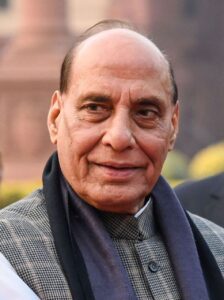Rajnath Singh Requests International Intervention in “Are Nukes Safe With Pak?
In his first trip to the Valley since India’s Operation Sindoor, a military strike on terror targets in Pakistan and Pakistan-Occupied Kashmir to exact revenge for the Pahalgam terror attack on April 22, Defence Minister Rajnath Singh traveled to Jammu and Kashmir on Thursday. He examined the Pakistani shells dropped in the border regions and assessed the Indian Armed Forces’ battle readiness and general security situation. Additionally, Mr. Singh met with army personnel at the Army’s 15 Corps Headquarters.

J&K Lieutenant Governor Manoj Sinha accompanied the Defense Minister Rajnath Singh .
“I would like to bow to the supreme sacrifice of the brave Jawans while they fought terrorism and terrorists,” Mr. Singh said, addressing the military. I honor their remembrance. I also honor the defenseless civilians who lost their lives in Pahalgam. I also honor the bravery of the wounded warriors and ask God to speed their recovery.
According to the defense minister Rajnath singh Operation Sindoor is a “big commitment” and the largest operation against terrorism. To put an end to terrorism, we will do whatever it takes. Pakistan must cease providing sanctuary to terrorists.
He also doubted that Pakistan could manage the nuclear weapons.
“The world is aware of our army’s precise aim, and when they hit their objective, the adversaries do the counting. The fact that we didn’t even give a damn about their nuclear blackmail shows how strong India’s commitment to combating terrorism is now. The world has witnessed Pakistan’s reckless menace to India.
From Srinagar today, I would like to bring up the question of whether nuclear weapons are secure in the hands of such a reckless and rogue state. “I think the International Atomic Energy Agency (IAEA) should be in charge of Pakistan’s nuclear weapons,” he stated.
Prime Minister Narendra Modi spoke with soldiers at Punjab’s Adampur air station earlier this week.
On the intervening night of May 9 and 10, following India’s “Operation Sindoor,” Pakistan attempted to strike several air force facilities, including Adampur. Additionally, Pakistan asserted—a claim denied by Indian officials—that its hypersonic missiles launched from JF-17 fighter planes destroyed India’s S-400 air defense system near Adampur.
From the Adampur Air Force base’s tarmac, PM Modi gave a forceful speech.
“Our intentions are clear: India will retaliate if there is another attack. This was evident following the 2016 terror attack on an Army base in Uri, J&K, and the Balakot airstrikes (following the Pulwama attack in 2019). “Operation Sindoor is the new normal,” the prime minister declared, stressing that “decisive action against state-sponsored terror attacks on its citizens” will become a policy of Indian governments.
During his speech, the prime minister also expressed gratitude to the military for protecting the country from Pakistan’s attacks as well as several terrorist attacks in the past.
Operation Sindoor, India-Pak ceasefire
In a nocturnal operation, India killed 100 terrorists by launching 24 missile strikes in 25 minutes at nine different places in Pakistan and Pakistan-Occupied Kashmir. The government claims that to show its new strategy for eliminating terrorists inside Pakistan, it chose to target the “snake’s head and not foot soldiers” this time.
Following India’s Operation Sindoor, tensions between the two nations increased. Since then, Pakistan has launched several waves of drone and missile attacks against Indian military installations in Punjab, Rajasthan, and Jammu & Kashmir, which India has repelled. Pakistan issued a truce call on Sunday evening, but within hours, they broke it.
Since then, there has been tranquility along the border.









